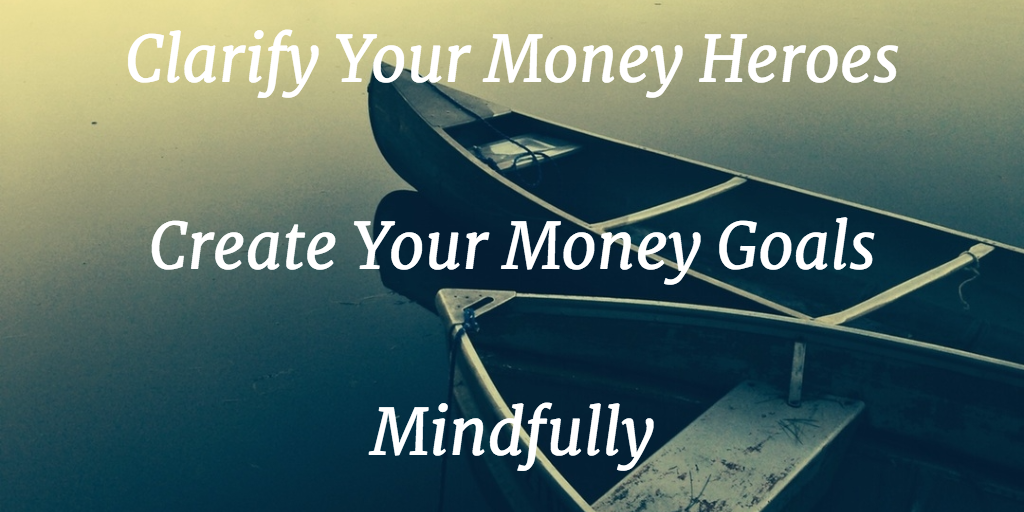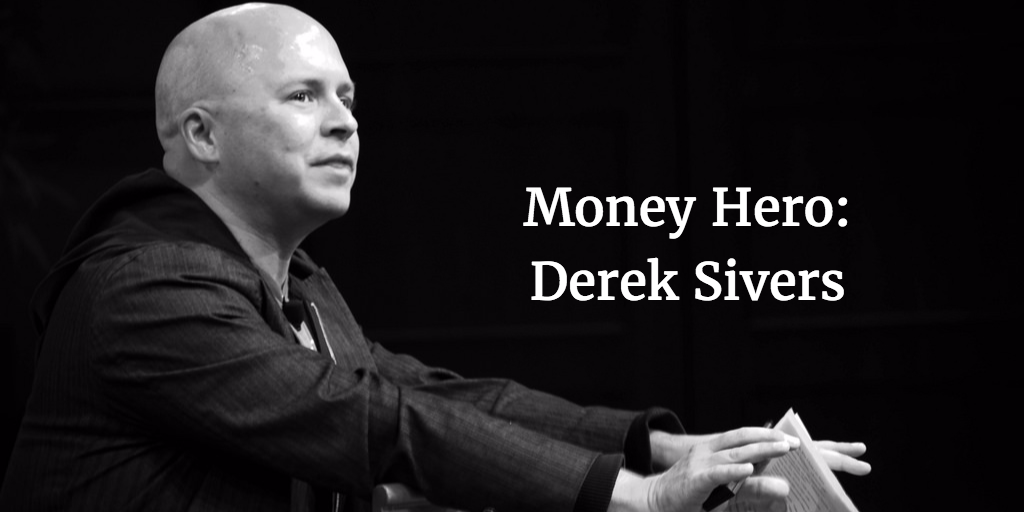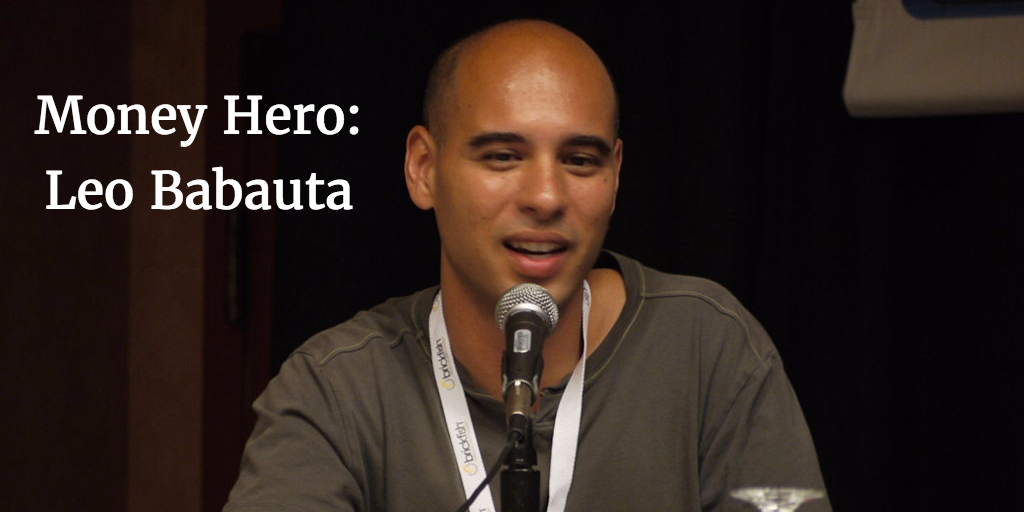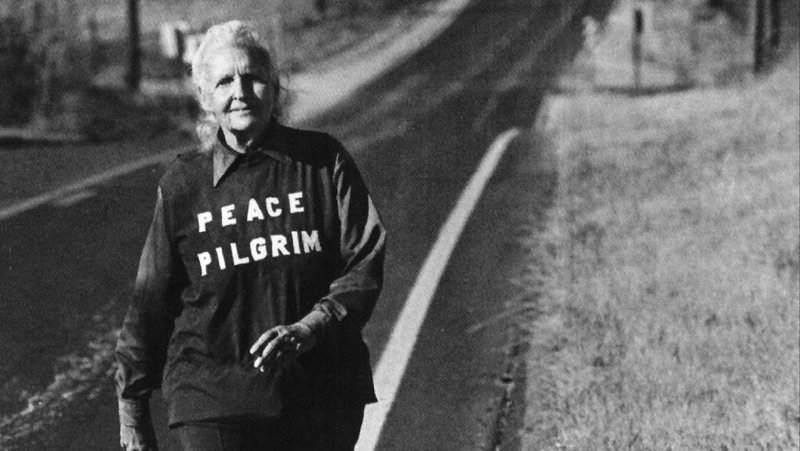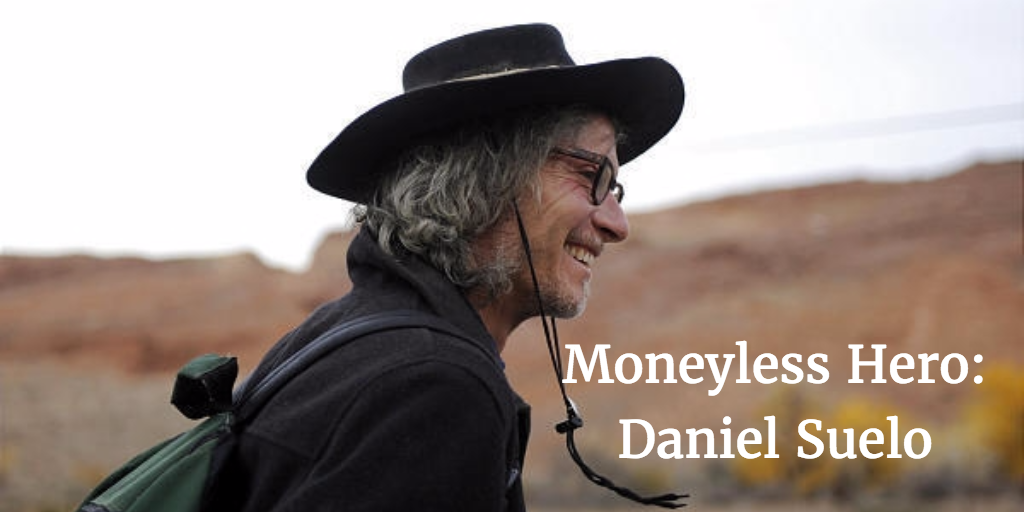Who are your money heroes?
Who are your money heroes?
I've found it life-changing to reflect on this. Without clarifying your thoughts on this question, here's what tends to happen...
You take on someone else's dream -- without consciously choosing it. It's often the dream of making "6-figures" (or 7-figures). Because the "money heroes" who are best at getting our attention are the ones are selling us the 6+ figure dream.
For years I pursued that dream. I successfully attained it... but then, I discovered I had reached a mirage.
I had built a business I actually didn't love.
I also found that many of my 6-figure peers were stressed out -- secretly feeling imprisoned by their business -- and compelled by peer pressure to always pursue the next financial goal (7-figures!)
But they weren't being public about their deep unease... and therefore, the 6 or 7-figure dream continues to be sold as the thing everyone should go for.
It took me a long time to come across a few money heroes that I could truly admire...
I've found it life-changing to reflect on this. Without clarifying your thoughts on this question, here's what tends to happen...
You take on someone else's dream -- without consciously choosing it. It's often the dream of making "6-figures" (or 7-figures). Because the "money heroes" who are best at getting our attention are the ones are selling us the 6+ figure dream.
For years I pursued that dream. I successfully attained it... but then, I discovered I had reached a mirage.
I had built a business I actually didn't love.
I also found that many of my 6-figure peers were stressed out -- secretly feeling imprisoned by their business -- and compelled by peer pressure to always pursue the next financial goal (7-figures!)
But they weren't being public about their deep unease... and therefore, the 6 or 7-figure dream continues to be sold as the thing everyone should go for.
It took me a long time to come across a few money heroes that I could truly admire...
These are ones who feel to me to be in right-relationship with money and service. They aren't the financially richest, yet they are deeply joyful, generous to others, and have inner & outer peace. Perhaps that's a better definition of success than "lots of money"?
Studying them has helped me connect my higher values to my business-building.
By sharing them with you, I hope it might save some unnecessary striving and suffering. May this help clarify your own true livelihood.
My "money" heroes:
1. Derek Sivers
2. Leo Babauta
My "moneyless" heroes:
3. Peace Pilgrim
4. Daniel Suelo
After describing each, I'll summarize my thoughts at the bottom of this post...
NOTE: They aren't perfect models, of course. But each contributes unique wisdom to my path.
Studying them has helped me connect my higher values to my business-building.
By sharing them with you, I hope it might save some unnecessary striving and suffering. May this help clarify your own true livelihood.
My "money" heroes:
1. Derek Sivers
2. Leo Babauta
My "moneyless" heroes:
3. Peace Pilgrim
4. Daniel Suelo
After describing each, I'll summarize my thoughts at the bottom of this post...
NOTE: They aren't perfect models, of course. But each contributes unique wisdom to my path.
Money Hero: Derek Sivers
Derek Sivers started a company providing a useful service (independent music publishing), built it up to a multi-million dollar business, then gave the company to charity, and now lives off a yearly trust payment (from the sale of the company.)
He now blogs prolifically about living a life of service to others. Some of my favorite posts:
He now blogs prolifically about living a life of service to others. Some of my favorite posts:
The Co-Op Business Model: Share Whatever You've Got
(Build a business from a spirit of giving what's useful...)
This article was one of my inspirations to switch from selling almost 100% of my content, to giving much of my content away.
It is a heartfelt way to build a business: give whatever we can for free. As we notice what we give has great demand, we can then consider charging something reasonable (and minimal) for it... not "the maximum the market will bear" but rather, charge what will be enough for you.
What if You Didn't Need Money or Attention?
(Look at "money" & "attention" as side effects, instead of the main pursuit.)
I like this idea.
I also think that money needs to be pursued to "enoughness", instead of always "more".
Why I Gave Away My Company To Charity
I admire his modeling of "enough" -- he doesn't want to accumulate. He just wants enough income to enable him to continue being of service to others.
However, I want to caution against the dream of "passive income". Untold numbers of people have been swindled by marketers selling "how to achieve passive income".
**
I disagree with Derek Sivers' advice for everyone to try to get rich because that supposedly proves one's usefulness to others...
Money is not an indicator of value to others. It is often an indicator of people's gratification needs, and sometimes contrary to spiritual needs.
Examples: junk food, porn, and get rich quick courses... are big money makers.
It's easy to get rich "providing value" in harmful ways, which satisfy people's ego but hurts their spiritual self.
For years, Derek spent 4-6 hours each day answering people's email, helping them out, providing tons of true value and usefulness... yet, with no money exchanged. He doesn't get rich doing this, but is being enormously valuable to others. Could he charge for that service? Probably. But my guess is that doing it for free provides him a tremendous sense of fulfillment & well-being. That's why he did it for years.
The point is to detach "adding value" from "making money."
Money Hero: Leo Babauta
Leo Babauta built a huge audience (2 million subscribers) with his writings on mindfulness & minimalism, and makes an ample (but not excessive) living by selling a fairly low cost ($20/mo) monthly membership program.
(Re: his ample income -- he supports his family, living in San Francisco, one of the more expensive cities in the world!)
My favorite article on how he thinks about business:
Authenticity & Trust in Business
A snippet of Leo's talk/article...
(Re: his ample income -- he supports his family, living in San Francisco, one of the more expensive cities in the world!)
My favorite article on how he thinks about business:
Authenticity & Trust in Business
A snippet of Leo's talk/article...
"The Direct Marketers coined a term … 'Call to Action'.
I’m going to end this talk with a Call to Inaction...
Don’t go out and spam people. Don’t go out and try to build a massive list and make a billion dollars.
Instead, pause.
Turn inward and see when fear and fantasy are driving you. Pause and be conscious about your actions, about your choices in your business.
Be curious. See whether you can be less spammy, less market-y, and instead treat people like human beings, and allow them to see you as an authentic human being.
This is a call for making conscious, authentic, trustworthy choices in your business. Because trust is more important than any number. And people are more important than massive profits."
What I admire is Leo's humility in marketing, and willingness to "leave money on the table" rather than making inauthentic choices.
He has over 2 million readers. He built up that audience with barely any calls-to-actions. And, never a pop-up. He makes an ample income, without being salesy.
What may be less emulatable about Leo is that he came from a copywriting background -- he was a journalist for 18 years before he started his blog! -- so his ability to write in an engaging way, especially great headlines, began above-average.
Most people need years to develop the skill of engaging others online. (Everyone can, however, find a natural way of sharing one's message.)
What I love is that Leo advises de-prioritizing money-making, and prioritizing, above all else, earning the trust of one's audience.
Check out Leo Babauta's tips for starting & building an audience successfully.
He has over 2 million readers. He built up that audience with barely any calls-to-actions. And, never a pop-up. He makes an ample income, without being salesy.
What may be less emulatable about Leo is that he came from a copywriting background -- he was a journalist for 18 years before he started his blog! -- so his ability to write in an engaging way, especially great headlines, began above-average.
Most people need years to develop the skill of engaging others online. (Everyone can, however, find a natural way of sharing one's message.)
What I love is that Leo advises de-prioritizing money-making, and prioritizing, above all else, earning the trust of one's audience.
Check out Leo Babauta's tips for starting & building an audience successfully.
Moneyless Hero: Peace Pilgrim
I've been listening to the free audiobook about Peace Pilgrim'a life & teachings. Very simple, deeply profound.
For 28 years, she walked spreading the message of peace, all across North America.
She always walked until given shelter, fasted until given food.
People expected that she would be austere & joyless -- and were greatly surprised to find one of the most joyful people they've ever met. She was continually connected to her divine essence.
Here's the kicker: she never asked others for anything!
(Talk about the opposite of marketing "Calls to Action.")
She said that asking is not necessary because (1) God always knows what we need, and will not let us die except when it is our time, and (2) if you really believe in the goodness within people, you will find it. (She proved this by living joyfully, without asking, for 28 years!)
Although she lived completely without money, she never prescribed that extreme lifestyle to others. Almost everyone she helped, taught, befriended, was established in the moneyed world.
What I admire most about Peace Pilgrim: her unfailing application of "Seek ye first the kingdom of God, and all things (you need) shall be given to you."
I aim to be a Peace Pilgrim in my own way, while living a "householder" life and being a business coach.
How will I do this?
Monetize Less.
When I'm able to give more for free, it makes me happy, and less obligated. I find that my actions become motivated intrinsically -- through a sense of meaning, connection, contribution -- instead of driven by external motivators.
I am continually finding creative ways to decrease my expenses, while increasing my connection with "the kingdom of God within"... deepening inner peace, happiness, and love for others, and learning to live simply, needing less stuff and income, and drawing more fulfillment from divine source and being with community.
I hope those reading this will also be inspired to need less externally, to connect to joy and freedom internally.
If you haven't listened to Peace Pilgrim's audiobook, check it out. It is free.
For 28 years, she walked spreading the message of peace, all across North America.
She always walked until given shelter, fasted until given food.
People expected that she would be austere & joyless -- and were greatly surprised to find one of the most joyful people they've ever met. She was continually connected to her divine essence.
Here's the kicker: she never asked others for anything!
(Talk about the opposite of marketing "Calls to Action.")
She said that asking is not necessary because (1) God always knows what we need, and will not let us die except when it is our time, and (2) if you really believe in the goodness within people, you will find it. (She proved this by living joyfully, without asking, for 28 years!)
Although she lived completely without money, she never prescribed that extreme lifestyle to others. Almost everyone she helped, taught, befriended, was established in the moneyed world.
What I admire most about Peace Pilgrim: her unfailing application of "Seek ye first the kingdom of God, and all things (you need) shall be given to you."
I aim to be a Peace Pilgrim in my own way, while living a "householder" life and being a business coach.
How will I do this?
Monetize Less.
When I'm able to give more for free, it makes me happy, and less obligated. I find that my actions become motivated intrinsically -- through a sense of meaning, connection, contribution -- instead of driven by external motivators.
I am continually finding creative ways to decrease my expenses, while increasing my connection with "the kingdom of God within"... deepening inner peace, happiness, and love for others, and learning to live simply, needing less stuff and income, and drawing more fulfillment from divine source and being with community.
I hope those reading this will also be inspired to need less externally, to connect to joy and freedom internally.
If you haven't listened to Peace Pilgrim's audiobook, check it out. It is free.
Moneyless Hero: Daniel Suelo
Daniel Suelo has a website with an amazing collection of contrarian ideas about money.
He lived without using money for 16 years.
His website contains a wealth of quotes about money from world religions.
The basic message: ancient religious wisdom agree that the hoarding of money is antithetical to genuine spirituality.
It makes sense. The more money you have, the less you are required to be good to other people (since you can pay someone to do your bidding)... while the less money you have, the more you need to depend on God/Universe and other people's goodwill... thereby requiring you to be good to other people.
Interestingly, a study of the super-rich found that they continually feel financially insecure.
Compare them to Daniel Suelo, a penniless man, who has more faith and feeling of security than most people...
Also check out this fascinating TED.com post that describes research on how money affects the mind. Quote:
“As a person’s levels of wealth increase, their feelings of compassion and empathy go down, and their feelings of entitlement, of deservingness, and their ideology of self-interest increases." ~Paul Piff, social scientist
He lived without using money for 16 years.
His website contains a wealth of quotes about money from world religions.
The basic message: ancient religious wisdom agree that the hoarding of money is antithetical to genuine spirituality.
It makes sense. The more money you have, the less you are required to be good to other people (since you can pay someone to do your bidding)... while the less money you have, the more you need to depend on God/Universe and other people's goodwill... thereby requiring you to be good to other people.
Interestingly, a study of the super-rich found that they continually feel financially insecure.
Compare them to Daniel Suelo, a penniless man, who has more faith and feeling of security than most people...
Also check out this fascinating TED.com post that describes research on how money affects the mind. Quote:
“As a person’s levels of wealth increase, their feelings of compassion and empathy go down, and their feelings of entitlement, of deservingness, and their ideology of self-interest increases." ~Paul Piff, social scientist
Comments from Readers
I originally posted this in Wisdompreneurs (a now defunct group on Facebook.)
I'd like to highlight a few poignant comments...
I'd like to highlight a few poignant comments...
"It strikes me as ironic that in this time when our political, economic, and corporate institutions are being critiqued for the destruction they are wreaking on individuals and on the environment, and are in such need of deep reform, even to the point of revolution - that so many leaders in the coaching industry are still apparently wanting to emulate the corporate model of amassing more and more wealth, as if that were a sustainable way for all - rather than seeking models that will prosper the general good.
I hear people parroting the same lines they learned from their mentors, uncritically, believing it must be true, for instance that "if you want to have more impact you have to make more money." And similar assertions that are never examined. (We could all name numerous people of huge impact who were not rich.)
What I am seeing is that True Abundance is living in a state of Flow, of interdependence in the ecosystem of life, and to trust that flow of giving and receiving . In this context hoarding is the antithesis of True Abundance for it is a desire to stop the flow. This is a state of consciousness as well as practice . It also implies re-establishing networks of support and connection that have been eroded in our culture's hyper-individualism and fragmentation.
It does not exclude acquiring wealth or savings, it is not anti-money, but it is resting in the knowing of safety and connection, rather than trying to shore up our separateness. "
~ Tomar Levine
I hear people parroting the same lines they learned from their mentors, uncritically, believing it must be true, for instance that "if you want to have more impact you have to make more money." And similar assertions that are never examined. (We could all name numerous people of huge impact who were not rich.)
What I am seeing is that True Abundance is living in a state of Flow, of interdependence in the ecosystem of life, and to trust that flow of giving and receiving . In this context hoarding is the antithesis of True Abundance for it is a desire to stop the flow. This is a state of consciousness as well as practice . It also implies re-establishing networks of support and connection that have been eroded in our culture's hyper-individualism and fragmentation.
It does not exclude acquiring wealth or savings, it is not anti-money, but it is resting in the knowing of safety and connection, rather than trying to shore up our separateness. "
~ Tomar Levine
"Thanks for sharing George. I especially love the Paul Piff quote. It rings true with my own experience. I've lived on a minimum income for over 16 years now but I've never felt poor. There has always been food on my table, clothes on my body, medical care and a house for me and my son. compared to many people in thus world I am incredibly rich. I feel grateful for all life has given me.
Having more money would open some new possibilities, but it would also shut some others down, especially when it comes to building character, bonding with other people and forming inter-dependent relationships money can become an obstacle rather than a vehicle of growth.
When you are experiencing emptiness and dissatisfaction with life, accumulating more money will certainly not be the answer. Rather than judging your life by the height of your salary ask yourself whether you are doing the things you came here to do, does your live reflect your deepest values, do you contribute to the happiness of others and could you die tomorrow without regrets."
~ Carla Geenen
Having more money would open some new possibilities, but it would also shut some others down, especially when it comes to building character, bonding with other people and forming inter-dependent relationships money can become an obstacle rather than a vehicle of growth.
When you are experiencing emptiness and dissatisfaction with life, accumulating more money will certainly not be the answer. Rather than judging your life by the height of your salary ask yourself whether you are doing the things you came here to do, does your live reflect your deepest values, do you contribute to the happiness of others and could you die tomorrow without regrets."
~ Carla Geenen
Conclusion
I like sharing about Derek Sivers & Leo Babauta, because they've "made it" in the eyes of the world... and yet, are radically loving in their approach to business.
Whether we could ever achieve their level of financial success, we can start today to emulate the authenticity and generosity they used to build their business from the ground up.
I like sharing Peace Pilgrim and Daniel Suelo, because they are examples that one literally doesn't need any money, to live a deeply happy life, and to be of profound service and significantly "add value" to others' quality of life.
Whenever you feel financial insecurity, remember these two moneyless heroes. Know that you, too, are taken care of by a great and loving force. You will always be fine.
Reconnect daily to your divine source, to access true security, peace, joy, and freedom.
Come to understand what shapes your ideas of enough.
I hope this post, and the links above, give you some food for thought and nurturance for the soul.
If you have clarified your own money heroes, I'd love to know. As always, I look forward to any of your thoughts & questions. You can comment on this blog post here.
With Love,
George Kao
Whether we could ever achieve their level of financial success, we can start today to emulate the authenticity and generosity they used to build their business from the ground up.
I like sharing Peace Pilgrim and Daniel Suelo, because they are examples that one literally doesn't need any money, to live a deeply happy life, and to be of profound service and significantly "add value" to others' quality of life.
Whenever you feel financial insecurity, remember these two moneyless heroes. Know that you, too, are taken care of by a great and loving force. You will always be fine.
Reconnect daily to your divine source, to access true security, peace, joy, and freedom.
Come to understand what shapes your ideas of enough.
I hope this post, and the links above, give you some food for thought and nurturance for the soul.
If you have clarified your own money heroes, I'd love to know. As always, I look forward to any of your thoughts & questions. You can comment on this blog post here.
With Love,
George Kao
Reminder: all of my blog posts are free to reproduce even without credit -- any segment, or the entirety of my posts, you are welcome to use anywhere. Whether you remember to mention my name, does not matter :) See my uncopyright statement here.
